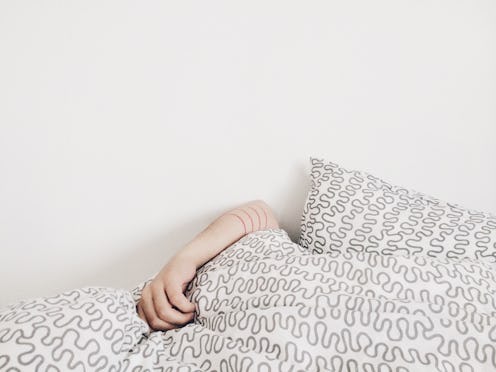Life
Your Poor Sleep Habits Cost The Economy Billions

You probably already know that sleep deprivation is bad for you. Lack of sleep can negatively affect everything from memory, to your metabolism, to your hormones, to even your longevity. But sleep isn’t only a matter of health — it’s an economic one, too. Poor sleep habits cost the economy billions of dollars every year, according to a new study by research firm RAND. It turns out that — shocker! — people who are chronically sleepy aren't terribly productive.
RAND estimates that poor sleep may be costing the United States $411 billion a year. In Japan, that number comes to $138 billion; Germany loses $60 billion, the UK another $50 billion, and Canadians a further $21.4 billion. These numbers are based on the total number of productive work days employees miss due to lack of sleep, according to RAND’s estimates. These losses are a significant blow to their countries’ economies — in the United States, that lost $411 billion equates to 2.28 percent of the U.S. GDP. In Japan, that percentage is even higher, coming out to 2.92 percent of the nation’s GDP.
RAND calculated these figures by consulting a survey conducted in the UK of 62,000 employees. (The firm admits in its report that people in large companies and financial and insurance industries are overrepresented in the study.) RAND then compared these survey results to a 2013 study by the National Sleep Foundation to estimate how sleeping habits affect workers in the United States, Germany, Canada, and Japan.
Quartz points out that certain aspects of RAND’s study are flawed. However, the study does usefully illustrate just how large an impact poor sleep habits can have, not only on health (and that impact is significant), but also on workplace productivity across the board.
The CDC reports that a third of U.S. adults don’t get sufficient sleep, and when people don’t get enough sleep, they can experience a decline in their cognitive abilities, decision-making skills, memory, and ability to concentrate. A lack of sleep also lowers one’s immune system, leading to more illnesses and sick days. Is it any wonder that insufficient sleep has a major effect on the productivity of the work force?
The Sleep Foundation recommends that adults aim for between seven and nine hours of sleep per night. Everyone’s bodies and sleep requirements are different, however, so the real key is to find the amount of sleep that allows you to feel awake and productive during the day, and commit to getting that many hours of shut-eye every night.
Images: elizabeth lies/Unsplash; Giphy